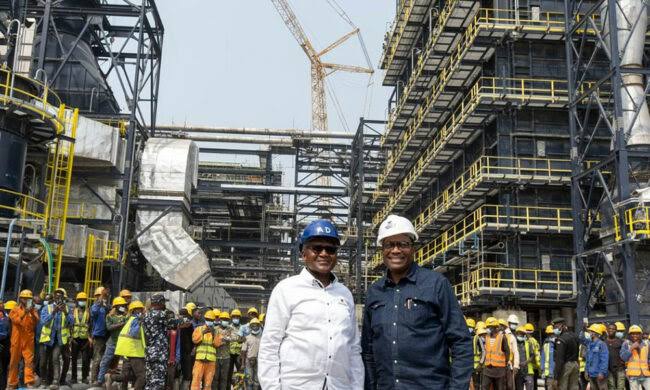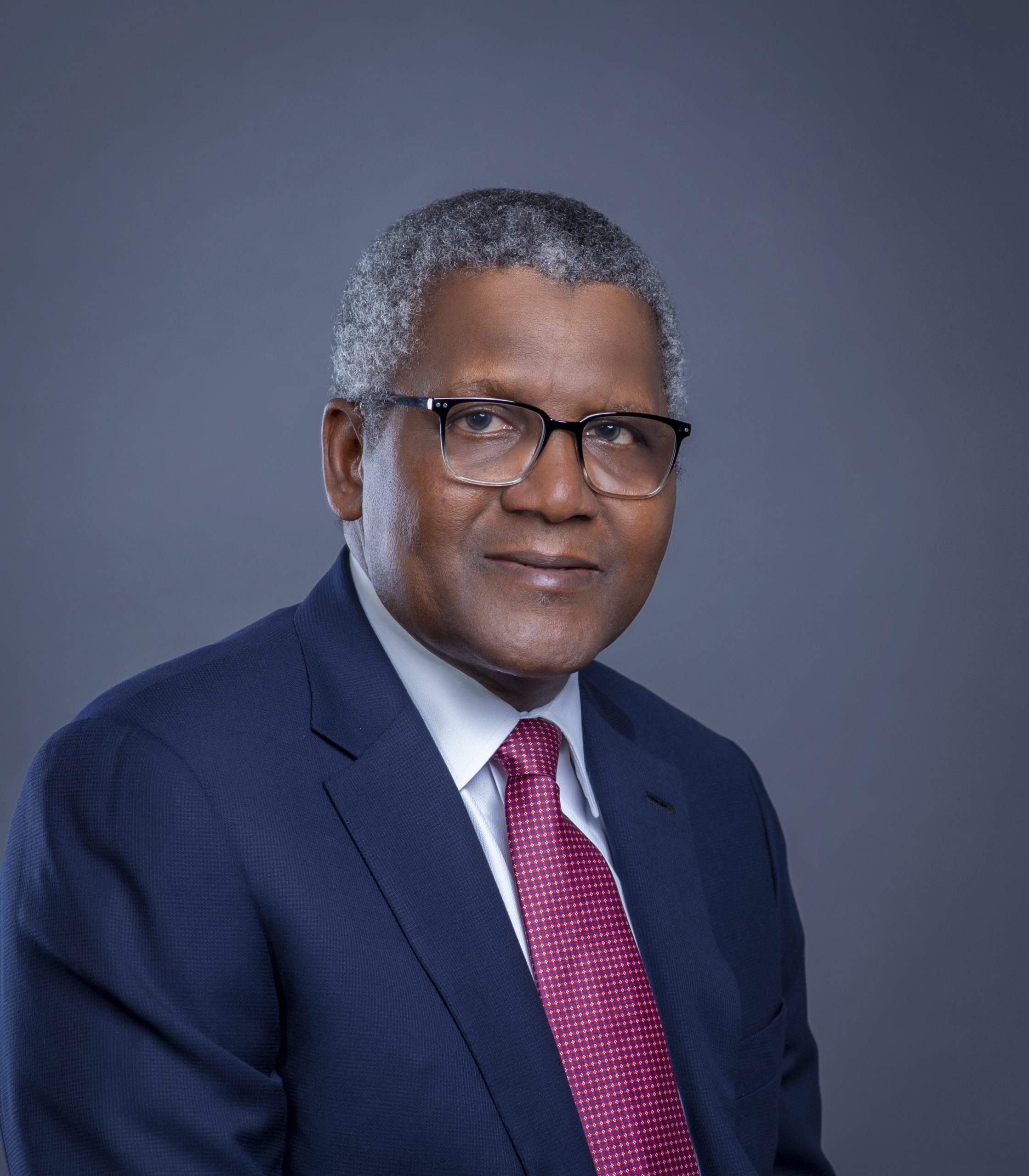EXPECTATIONS ABOUT DANGOTE REFINERY INAUGURATION ARE EXTREMELY EXAGGERATED
From Editorial Board, Africa Oil+Gas Report
The ceremony around the planned visit by the Nigerian President to the Dangote Refinery on May 22, 2023, will peak with a cutting of the ribbon, inaugurating the 650,000 Barrels per stream Day Plant, located in the Eastern flank of Lagos, the country’s commercial city.

Everyone, it seems, look forward to the production of petroleum products from the plant after that symbolic activity.
But it will not happen.
As President Muhammadu Buhari leaves office a week after commissioning one of the largest single train hydrocarbon processing plants on the planet, he could be forgiven for believing he had had his wish to be in such a large place but technology does not sit well with politics.
The ongoing technical commissioning process has not gotten anywhere close to the point of introducing raw hydrocarbon into the plant, let alone delivering petroleum products.
One key challenge of Nigeria’s chattering classes is that they hardly look up the regulation. Hydrocarbon will be introduced only when the Nigerian Midstream Downstream Regulatory Agency (NMDPRA) approves and issues Licence To Operate the Refinery to Dangote.
Speculations about inauguration and commissioning are just, well, speculations. Both words do not appear anywhere in the Procedure to License a Refinery in the Nigerian law.
The three stages are:
License to establish a Refinery
Approval to construct Refinery
License to Operate the Refinery
Nowhere does inauguration or commissioning appear.
So the Refinery can be inaugurated or commissioned as the Licensee desires, as long as no attempt is made to operate the Refinery by introducing crude oil and make products for sale, it does not concern NMDPRA.
The claim that some “large sub-sea pipeline infrastructure connected to Oil and Gas blocks in the Niger Delta region for supply of crude feedstock” is a false narrative. What’s in the plan is that Single Point Mooring (SPM) buoys will play the transportation role in input crude delivery and output petroleum products.
We live in a society where optics trumps everything. Buhari has been president for 8 of the 9 years that the Refinery project has been on. What is wrong with Dangote asking the President to inaugurate the Refinery so his name is on the marble when the Refinery becomes fully operational? Afterall no law will be breached by such gesture?
That said, Aliko Dangote the billionaire owner of the Refinery is determined that the 19billion-dollar project, the second of his three, hydrocarbon processing mega projects (Fertilizer, Refinery and Petrochemicals) is delivered by end of 2023.
The technical work has gone far, involving trial-running every single equipment, which has taken a while because of the lengthy time of construction. Some equipment were installed six years ago, and were just standing there in the air, water or even underground. Anything, literally could have happened.
As of February 2021, the installation of the Crude Distillation equipment had been completed. So had the kitting up of the Residue Fluid Catalytic Cracking Unit (RFCCU).
Supply chain challenges thrown up by the COVID-19 did slow down work, but the construction of Africa’s largest hydrocarbon processing factory picked up steam again in mid-2021.
“The electrical and instrumentation works are usually invisible to the gaze of non-refinery workers, but they are key. Their installation needed extreme care and it consumes over 30% of the Refinery construction time,” say several managers familiar with the project.
“A lot of our contractors are Chinese. Those who went home couldn’t come back quickly, but the project workflow recovered and those installations especially that of the Crude Distillation Column, which arrived Nigeria in December 2019 were expedited.
“We will have 15 process units in the Refinery and they must all work together” the managers tell us.
The operations planning will emphasize the mantra at the commissioning: we must flow everything out with air, then do it with water, then with steam, them with air again”. This is all to ensure that the likelihood of moisture absorption is zero, as the contrary will lead to cracks.
“The equipment must be pickled. What that does is that it oxidizes the facility”. The Dangote Refinery is significantly an Indian supervised operation.
But a significant percentage of the 1,000 Nigerian engineers sent to training in India for the eventual operations of the facility, have returned and are currently engaged on site.
The relationship between the Nigerian crude oil refining sector and Indian engineering expertise goes back to 1988, when the second (larger) refinery in Port Harcourt, the major city in the country’s oil producing Delta region was being constructed.
“Some of the experts working on Operations Planning were part of the construction of the Port Harcourt Refinery 35 years ago”, our sources say.Mr Dangote initially announced the likelihood of the project in 2013. But it was at the All-Convention Luncheon at the Annual Conference of the Nigerian Association of Petroleum Explorationists NAPE, in November 2014 that he provided the first relatively comprehensive details of the facility. He told the roomful of geoscientists that the capacity had increased from 500,000 BSPD to 650,000 BSPD.
Dangote Industries was advised by Jacobs Engineering and it licensed the Honeywell UOP for the basic engineering design. On a daily basis, the facility will have the capacity to produce 59million liters of gasoline, 20million litres of kerosene and 9million litres of diesel and others.
The construction has taken a while and has been the most excruciating economic challenge Nigeria has ever faced. Would Dangote Industries have delivered this project much earlier if it had awarded it to a world- class EPC contractor like Bechtel, TechnipFMC, Siemens, KBR?
“Yes”, said Alex Ogedengbe, a retired Group Executive Director at NNPC who was involved in the construction of the Warri and Port Harcourt Refineries in the 1980s. “There are just about six or seven such EPC contractors in the world,” he explained. Mr Ogedengbe was speaking at a private webinar organized by oil and gas analyst, Ronke Onodeko in April 2020.
Dangote sources maintain that the cost would have been at least 30% higher if that route had been taken. And while it could be argued that Dangote Industries could have had good value for money if a Bechtel or KBR had handled the construction, multiple sources argue that the delay could have been minimized if the current structure had been in place since inception. The company went into this project with the mindset of constructing a cement plant, which was its major competence before this huge assignment. “We wasted the most time at the engineering stage”, one manager recalls. “A reputable EPC contractor would still have hired expertise from outside like we are doing and subcontract several units. Dangote Industries bought brand new equipment for this work; an EPC contractor might not have even done that, but it would have coordinated things better at the outset.”
One more advantage of building it yourself: all the equipment you purchase for logistics and construction purposes are yours.
Everyone we spoke to agreed that things began to take very good shape when Giuseppe Surace came along. The Italian engineer who had been Chief Executive of Saipem in Nigeria and Brazil, joined the project in June 2017 as the Chief Operating Officer. “On the factory floors, in the Executive Offices, everywhere on site, the consensus is that one of the best decisions that Aliko Dangote made was Surace’s appointment. “He saved the project” said our sources.
A highlight of the swirling speculations around President Buhari’s impending visit is the description of how crude oil will be pumped into the Refinery. One widely circulated message talks of large sub-sea pipeline infrastructure connected to Oil and Gas blocks in Niger Delta region for supply feedstock “.
This is a false narrative.
The truth is that Single Point Mooring SPM buoys will play a huge role in input crude delivery and output petroleum products. There are three of them either way. Three SPMs will deliver the input crude oil from vessels into a jetty from which it is pumped into the plant. And three SPMs will ferry petroleum products out to vessels on the sea for export. “We have facility to evacuate through roads, we have large loading capacity (103 loading terminals) and we can evacuate 75% of our production through road and we can evacuate 75% of our production through the sea so that if we want to export”, Dangote officials have repeatedly explained.Within Nigeria, we can evacuate to Warri, Port Harcourt, Calabar and so on, those options are available”, the officials say.
On the table is the idea of a 6-lane road through Epe, a town in the east of Lagos. But what of the supply of the product to Lagos? Will some of it be through Lekki Expressway? The subject of the quality of Nigerian roads to take in the products, through land tankers is still a fraught one.
Editorial, Oil+Gas Report





 Business6 months ago
Business6 months ago
 celebrity radar - gossips4 months ago
celebrity radar - gossips4 months ago
 celebrity radar - gossips4 months ago
celebrity radar - gossips4 months ago
 Business3 months ago
Business3 months ago










